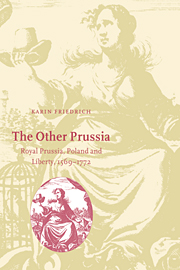Book contents
- Frontmatter
- Contents
- Preface
- Gazetteer
- Glossary
- List of abbreviations
- Map 1
- Map 2
- 1 Introduction
- 2 The origins of Royal Prussia
- 3 Royal Prussia and urban life in the Polish-Lithuanian Commonwealth
- 4 History, myth and historical identity
- 5 Political identity in the cities of Royal Prussia and the meaning of liberty (1650–1720)
- 6 Loyalty in times of war
- 7 Divergence: the construction of rival Prussian identities
- 8 Centre versus province: the Royal Prussian cities during the Great Northern War
- 9 Myths old and new: the Royal Prussian Enlightenment
- 10 Conclusion
- Bibliography
- Index
- CAMBRIDGE STUDIES IN EARLY MODERN HISTORY
3 - Royal Prussia and urban life in the Polish-Lithuanian Commonwealth
Published online by Cambridge University Press: 22 September 2009
- Frontmatter
- Contents
- Preface
- Gazetteer
- Glossary
- List of abbreviations
- Map 1
- Map 2
- 1 Introduction
- 2 The origins of Royal Prussia
- 3 Royal Prussia and urban life in the Polish-Lithuanian Commonwealth
- 4 History, myth and historical identity
- 5 Political identity in the cities of Royal Prussia and the meaning of liberty (1650–1720)
- 6 Loyalty in times of war
- 7 Divergence: the construction of rival Prussian identities
- 8 Centre versus province: the Royal Prussian cities during the Great Northern War
- 9 Myths old and new: the Royal Prussian Enlightenment
- 10 Conclusion
- Bibliography
- Index
- CAMBRIDGE STUDIES IN EARLY MODERN HISTORY
Summary
The City of Dantzigk is in the province of Pomerellia, reckoned under the Crown of Poland, reckoned also in Prussia. … in the Yunckerhoff are certaine orders having a Free Brotherhood or company of the principall off the City, admitting through Friendshippe whome they thinke good. These att some daies in the yeare hold Frolicke Feasts, where is lusty Chear, good wyne and beere, musicke of various sorts … all with Civill Mirth. The Order and Attendance more than Burgameisterlike, the Servitours with garlands on their heads … as the drummers in Holland and these parts use. These Feasts might well beecom the entertayne off an Embassador or a Prince for order, state and plenty.
(Peter Mundy)The Artushof in Danzig, here described by the English traveller Peter Mundy who passed through the city in 1640, served as the political and ceremonial meeting place for the St George merchant brotherhood, whose members in Teutonic times had martially excelled in crusades against the Baltic pagan tribes. At the turn of the fifteenth century, the merchants of Danzig, most of German or Flemish origin, had secured dominant positions in the city's economy and in the council. These medieval connotations of knighthood changed their meaning, however, in the same measure as the alienation between the burghers and their Teutonic masters intensified, before Danzig switched allegiance to the Polish crown and shouldered the main burden of the war against the Order.
- Type
- Chapter
- Information
- The Other PrussiaRoyal Prussia, Poland and Liberty, 1569–1772, pp. 46 - 70Publisher: Cambridge University PressPrint publication year: 2000



